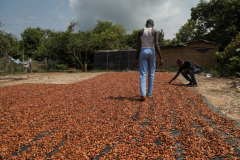Comment: The EU’s new deforestation law was seen as a breakthrough in the global battle against forest loss, but it’s provoking fractious debate among governments and producers
Nicole Polsterer is the sustainable production and consumption campaigner at forests and rights NGO, Fern.
Initially the EU Deforestation Regulation (EUDR) was hailed as a game-changer in the fight against illegal forest clearing.
It was the first law of its kind in the world – and when it came into force in June 2023 it had an overwhelming democratic mandate from EU member states and the European Parliament.
The law signalled their resolve to end EU complicity in global forest destruction by only allowing EU market access to companies that can prove their products made from cattle, wood, cocoa, soy, palm oil, coffee and rubber are deforestation-free.
Agricultural production is the biggest driver of deforestation on the planet, and these specific commodities’ impact on forests and peoples’ rights has been nothing short of catastrophic.
But as the EUDR’s implementation day – December 30, 2024 – edges closer, the positivity has been supplanted by a barrage of negative stories.
More cocaine, fewer diapers?
In March, Austria’s agricultural ministry called for implementation to be postponed. This appeal has been echoed by agricultural ministries in Czechia, Finland, Italy, Poland, Slovakia, Slovenia and Sweden, as well as the European People’s Party (EPP).
The debate around the law has grown increasingly fractious.
In May, the US Secretaries of Commerce and Agriculture wrote to the European Commission demanding that the EU delay the law, as it posed “critical challenges” to American producers.
EU hit with lawsuit over green labelling of aviation and shipping investments
Meanwhile South American diplomats warned it would aggravate Europe’s cocaine problem, as poor Peruvian and Colombian farmers wouldn’t be able to prove that their coffee or cacao wasn’t grown on deforested land and would shift to farming coca leaves instead.
As well as more cocaine on their streets, Europeans would find fewer diapers, sanitary pads and other hygiene products on their supermarket shelves, according to US paper-makers. At the same time, the European timber industry claimed that the law was “a huge regulatory and administrative monster”.
And all this came against a backdrop of warnings about price rises for food, drink and other goods.
Industry sabotage
So how did a law designed to tackle one of the greatest environmental challenges of our time become so divisive? And what is the true picture on the ground as industries prepare to implement the law?
Two things are abundantly clear. The first is that agricultural deforestation is a deep-seated, complex problem, and eliminating it presents real challenges.
Fern, which first called for a law to combat the illegal deforestation tainting the EU’s imports of agricultural commodities a decade ago, has consistently highlighted one of the biggest challenges: ensuring that the smallholders who could be affected by the regulation receive the specific support they need, and that companies don’t squeeze them out of their supply chains.
Second, powerful vested interests within affected industries and EU member states are intent on sabotaging it.
A proper assessment paints a different picture.
Galvanising effect
Away from breathless headlines about Europe being flooded with cocaine, the humdrum work of preparing for implementation is steadily progressing.
Cote d’Ivoire and Ghana are the world’s biggest cocoa producers, and Europe is their largest market. The new law therefore could have a profound impact on those countries’ economies and peoples’ lives.
While European industry and big US wood companies are claiming they can’t meet the EUDR’s requirements in time, Ghana’s cocoa regulator, COCOBOD, recently stated that their traceability system – which will prove sustainability by tracing cocoa beans from the farm where they’re produced to the port of shipment – will be operational from October 2024.
Can the rising cost of chocolate help cocoa producers go green?
In Cote d’Ivoire, a similar story is also unfolding.
The Ivorian government has been distributing ID cards to farmers that will increase traceability and allow them to receive e-payments. Though this system will take time to roll out, it will stop the widespread fraudulent underpayments which are so damaging to small-scale farmers’ livelihoods.
It’s no surprise then that a group of 120 Ghanaian and Ivorian civil society and farmer organisations recently wrote to EU decision-makers, expressing their deep concerns about member states trying to delay the EUDR.
Indigenous land rights
Their call was echoed by more than 170 NGOs from around the world, including Articulação dos Povos Indígenas do Brasil (APIB), which represents more than 300 Brazilian Indigenous Peoples’ groups.
APIB have long been at the forefront of efforts to protect the Amazon and Brazil’s other precious biomes from the ravages of agribusiness and loggers. They see the EUDR as a way of not just protecting nature but helping to safeguard Indigenous Peoples’ territorial rights. Earlier this year, APIB called for the EUDR to be extended into non-forest biomes such as the Cerrado.
Some consumer goods giants who will be affected by the EUDR are also defending it: in July, Nestle, Mars Wrigley and Ferrero wrote to the European Commission defending the law as “an important step forward in driving the necessary transformation of the cocoa and chocolate sector”.
They called for more EU support, which should include funds to help smallholders adjust to the law’s demands, and equitably negotiated partnerships with the countries producing goods that fall under the legislation’s scope.
Support for affected producers
Last year, the world lost an area of forest almost as big as Switzerland; destruction that released about a half as much carbon dioxide as the United States does annually through burning fossil fuels.
Delaying or abandoning the law on the eve of it being applied is not an option, but its success depends on how it’s implemented: how the EU rises to its inevitable challenges, and how far the EU is prepared to increase its support to affected smallholders and countries.
We need to redouble our commitment to making it work and oppose those resisting it out of short-sighted self-interest.





